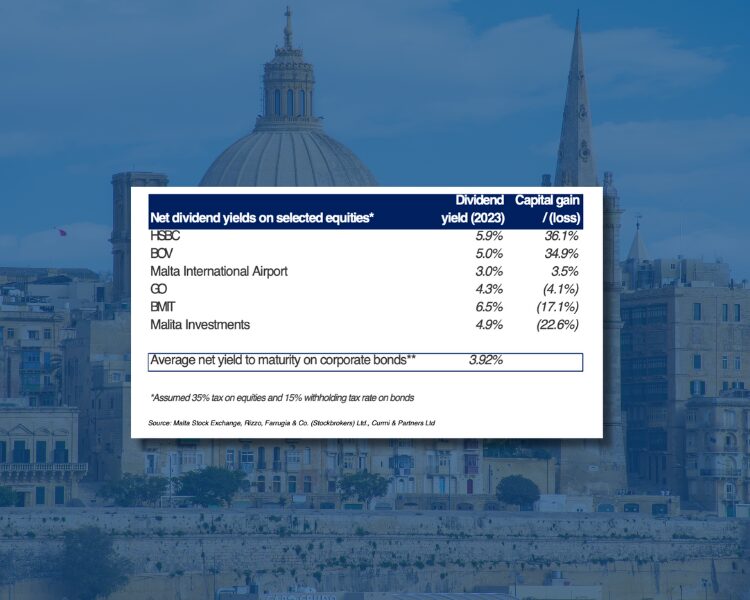
Patrick Debattista
The Malta Stock Exchange currently has a total of 123 active corporate bonds: 103 listed on the Main Market and 20 on the Prospects MTF.
Bonds are instruments used by companies to borrow money from the public.
They are generally listed for a finite period until they mature, after which the proceeds are paid back to the public and the bond disappears from the stock market.
Most corporate bonds have been listed successfully and over-subscribed by the public; demonstrating their popularity among the investing community.

Bond investing: Pros and cons
The advantages of investing in bonds include a stable income stream in the form of regular interest payments (coupons), lower volatility than equities and priority in the event of liquidation.
The drawbacks include lower returns, various risks (including reinvestment, inflation, interest rate, credit, liquidity and call risk) and the absence of underlying ownership in the entity concerned.
Equities: The situation
Equities, on the other hand, are shares of entities that are publicly traded on a recognized stock exchange. They represent ownership of these entities.
Unless they are delisted, equities usually remain on the Equity Register indefinitely.
The Malta Stock Exchange currently has 32 listed equities. Unfortunately, many of these equities rarely see any trading activity.
Various sources have quoted the equity market as being one of the biggest wealth creation vehicles in history.
Household names such as NVIDIA in Taiwan, Apple in the USA, LVMH in France, Novo Nordisk in Denmark, and many others, all attribute a large part of their success story to their stock market listing.
So the question is: Why is there such an indifference towards the local equity market?
Why does so much capital seemingly flow into the corporate bond market and so little into equities?
Bonds versus equities
One reason that is often touted is Malta’s apparent historical aversion to risk.
In general, bonds are “safer” investments than equities.
However, research conducted by the CFA Institute showed that a diversified portfolio of equities and bonds performed significantly better (both in return and in risk-adjusted terms) than a portfolio that was entirely composed of bonds.
Another reason why Maltese investors tend to prefer investing in bonds is the presence of income.
Bonds generate a fixed coupon.
For equities, companies can choose to pay out dividends, but these are discretionary.
The cold, hard numbers: Are equities all that bad?
Having said that, a quick analysis of a select number of equities shows a strong dividend yield in 2023 that even exceeded the average yield to maturity on corporate bonds (see table below).
Of course, the benefits of owning equities are not just the potential to earn a dividend, but also the opportunity to participate in the ownership and growth story of some of the largest companies on the island.
Equity investment means actual ownership of businesses for as long as you hold the shares.
Locally, much has been made of the lack of activity in the equity market, despite strong interest and high returns being generated elsewhere in the world.
However, with new initiatives being introduced to stimulate trading activity and many listed entities reporting solid financial results and high dividend yields, could this finally be the time that Malta’s equity market stepped out of the shadows?
You Might Also Like
Latest Article
Malta’s Economy Holds Steady But Retail And Services In Decline Says Central Bank
Malta’s economy showed resilience in the second quarter of 2025, holding broadly steady despite ongoing weakness in retail trade and services activity, according to the latest Economic Update published by the Central Bank of Malta. While overall growth indicators were stable compared to the first quarter, underlying data revealed persistent pressures in consumer-facing sectors that … Continued
|
30 July 2025
Written by Hailey Borg

Malta Ranks Second In EU For Electric Car Uptake In 2024 Despite EU-Wide Drop
|
30 July 2025
Written by Hailey Borg

HSBC Malta Posts €58.7m Profit Before Tax Despite Lower Interest Rates
|
30 July 2025
Written by Hailey Borg










